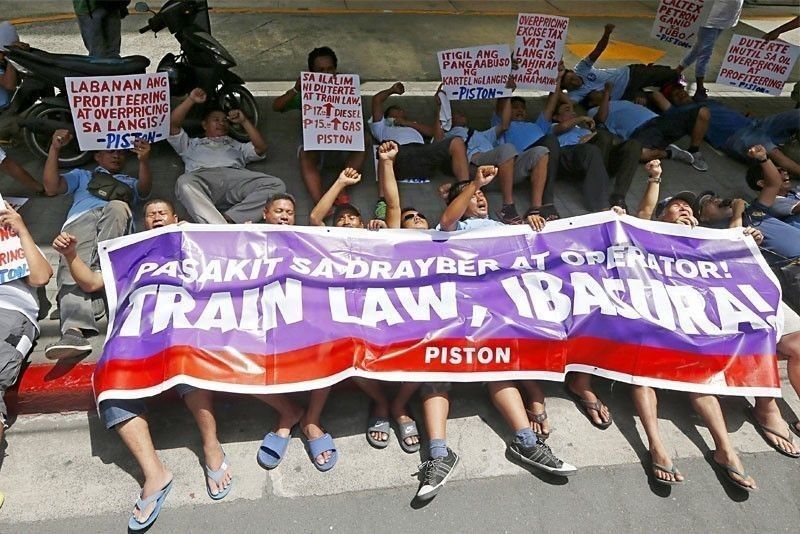See you in 90 days!

There is no end in our journey on the road to improvement. No one knows everything, and once in a while, we make the gawkiest and most humiliating mistakes — but unconsciously, we grow even from these small crunches. And undeniably, the only route towards becoming the better version of ourselves is to have the belief that to triumph over these adversities, we must be willing to 1) accept our mistakes and 2) learn from them. But that is just half-done. Most of the time, we fail to remember the most important ones: 3) to enhance and strengthen ourselves, 4) to patch up and iron things out, and finally, 5) move forward.
Just like its people, the government also took the initiative to reevaluate themselves, grabbed its pen and paper and rewrote the current tax system to address its weaknesses to be, if not perfect, mutually agreeable on the perspective of both the tax authorities and the taxpayers.
Simpler, fairer and more efficient for all — this is what the administration wanted to accomplish by passing the Tax Reform for Acceleration and Inclusion (TRAIN) into law. The TRAIN Law seeks to resolve its shortcomings in the old tax system, including the establishment and implementation of an enhanced value-added tax (VAT) refund system.
Prior to the amendment by the TRAIN Law, Section 112 of the National Internal Revenue Code (NIRC) allows refunds or the issuance of tax credit certificates to VAT-registered taxpayers on its unutilized input VAT arising from the following: 1) sales of goods, properties or services that are zero-rated or effectively zero-rated, or 2) cancellation of VAT registration. The grant must be made within 120 days from the date of submission of complete supporting documents.
Subsequently, Section 36 of the TRAIN Law revised Section 112(C) of the NIRC, and provided notable modifications: 1) elimination of the citations on tax credit certificates; 2) shortening of the period for the Bureau of Internal Revenue (BIR) to process and decide on the refunds for creditable input taxes to 90 days from the date of submission of the relevant documents in support of the application filed; 3) should the BIR find the claim unreasonable, the BIR must state in writing the legal and factual basis of the denial; and lastly, 4) it guarantees the taxpayers that failure on the part of any official, agent, or employee of the BIR to act on the application for refund within the 90-day period will be punishable by law.
Much the same as the rule prior to the TRAIN Law, the BIR still gives the taxpayers two years from the close of the taxable quarter when the sales were made, or from the date of the cancellation of VAT registration to apply for their VAT refund. In cases where the application for VAT refund has been fully or partially denied by the BIR, taxpayers still have a 30-day period to appeal with the Court of Tax Appeals (CTA). The allowed refunds shall be made upon warrants drawn by the commissioner of internal revenue or his duly authorized representative.
On March 15, 2018, Revenue Regulations No. 13-2018 was issued by the secretary of finance to implement certain VAT provisions under the TRAIN Law. Section 4.112-1 of the said issuance states that a refund shall be granted for creditable input taxes within 90 days from the date of submission of the appurtenant documents in support of the application for the claims for refund filed starting Jan. 1, 2018. It was further mentioned that pending the establishment of the enhanced VAT refund system, the said 90-day period shall be up to the date of approval of the recommendation report on such claim for VAT refund. Also, the said issuance mentioned that failure on the part of any official, agent, or employee of the BIR to act on the application within the 90-day period shall be punishable under Section 269 of the NIRC.
Then, on Dec. 27, 2018, the secretary of finance further issued RR No. 26-2018 providing that the 90-day period to process and decide shall start from the filing of the application of the claim, up to the release of the payment of the VAT refund. The application is considered to have been filed only upon submission of the relevant documents.
With the change introduced by RR No. 26-2018, it seems that the government is keen in accelerating the refund process.
Be that as it may, RR No. 26-2018 gives rise to a few ambiguities, as follows:
First, it is apparent under the NIRC that the claimants are allowed to appeal the decision of the BIR to the CTA. If the 90-day period is up to the date of release of the payment of VAT refund, it will, at some point, run simultaneously with the taxpayers’ 30-day period to appeal the BIR’s decision.
Second, RR No. 26-2018 eliminates the phrase “pending the establishment of the enhanced VAT refund system…” explicitly indicated previously in RR No. 13-2018. With its removal, can the taxpayers assume that RR No. 26-2018 is already the enhanced VAT refund system? Supposing this is the case, does this mean RR No. 26-2018 has the effect of subjecting to the 12 percent VAT certain transactions currently treated as zero-rated?
It is hoped the BIR will release additional guidance so that it will be clear to the public how the BIR envisions the implementation of RR No. 26-2018. Expectant taxpayers are naturally skeptical and do not just simply run around a maze not knowing what will happen next. It is not enough that they know what is in store for them. They will definitely wait for the BIR to patch these issues and iron out what is ambiguous and inexplicable to make things understandable for them to move forward.
If all parties are clear on how RR No. 26-2018 will operate, the refund process may be considerably improved and taxpayers will gladly see their cash refund in 90 days or less.
Lysa Mae D. Atian is a supervisor from the tax group of KPMG R.G. Manabat & Co. (KPMG RGM&Co.), the Philippine member firm of KPMG International. KPMG RGM&Co. has been recognized as a Tier 1 tax practice and Tier 1 transfer pricing practice by the International Tax Review.
This article is for general information purposes only and should not be considered as professional advice to a specific issue or entity.
The views and opinions expressed herein are those of the author and do not necessarily represent the views and opinions of KPMG International or KPMG RGM&Co. For comments or inquiries, please email [email protected] or [email protected].
- Latest
- Trending






























